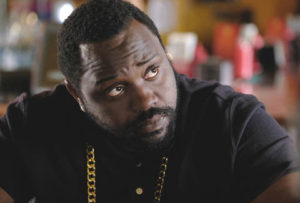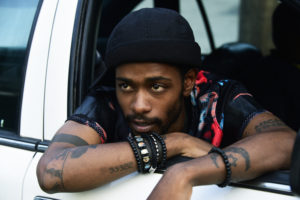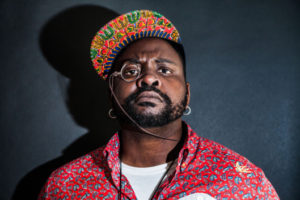3. Atlanta
Atlanta and the Quiet Confidence of Indifference
To paraphrase Kanye West at his most boastful (and accurate), Atlanta does not need your pussy: it’s on its own dick. This show could give a fuck if you enjoy, comprehend or even watch it in the first place and, somehow, that just makes it all the more enticing. There’s a way to carry that kind of attitude that can immediately backfire; you ever notice how often the guy who insists he doesn’t care what everybody thinks of him is universally despised? But Atlanta, more than any other premiere season of television in recent memory, has a sure-footendness and blissful, cohesive tone that makes its indifference seem more winsome than reactionary. It’s like turning down a quiet hallway at a raucous house party to find an incredible musician just playing a song for themself in a corner. You almost don’t want to tell anyone else what you’ve stumbled on because that might kill the singular vibe of it but, Jesus, you really owe it to people to let them know something special is happening.

At the outset, though, let’s be honest about how badly this could have turned out. Say what you will about series creator and star Donald Glover, he’s hardly the most consistent when it comes to his creative output. Beginning as a writer and story editor on 30 Rock in 2003, Glover later went on to form a sketch troupe called Derrick Comedy, which produced some fitfully funny skits; he then began establishing himself with his stand-up routines, where his material was usually much more solid. Undoubtedly, he is best know either as the joyous, simple-minded jock Troy Barnes from Community (which he absolutely killed) or as his rapper handle, Childish Gambino (which… meh). Most of the time when I hear that Glover has a new project in the works, my response is general curiosity peppered with a decent pinch of skepticism. I did not have the highest of hopes for Atlanta, is what I’m saying, which could be part of the reason it managed to bowl me the fuck over in the way it did.

Glover plays Earnest “Earn” Marks, a Princeton drop-out who returns home to Atlanta, Georgia and starts work at an airport trying to get people to sign up for frequent flyer points. It’s not a particularly gainful nor rewarding occupation, something that’s not lost on him (“I know, right?” sighs Earn when told by someone he approaches to fuck off) but it’s a necessity to support his infant daughter and her mother Van (Zazie Beetz, spectacular), with whom Earn has a complicated relationship. During one of his shifts, a coworker of Earn’s shows him a viral hit by a budding local rapper called Paper Boi (Brian Tyree Henry, a revelation). To his surprise, Earn sees that Paper Boi is his cousin Alfred and so, after deciding he could actually make something of himself in the rap industry, approaches him with a proposition to manage his hip hop career. Alfred and the only member of his entourage Darius (Keith Stanfield, fucking hilarious) are initially reluctant to let Earn into their enterprise, but they soon agree when he’s able to get Paper Boi’s track played on a local radio station. After the pilot, with a few notable exceptions, every episode thereafter is dedicated to Earn, Paper Boi and Darius’ attempts to monetise their efforts of breaking into the rap game.

For those who don’t know much about the diverse and legendary music scene in Atlanta (or who just don’t fuck with hip hop and R&B in general), suffice it to say we wouldn’t have any of the radio-friendly hits by artists like OutKast, Cee Lo Green or Usher without the great Georgia city; on that note, let’s all just give a little thanks for “Hey Ya!”, “Fuck You!” and “Yeah!” (they’re pretty big on exclamation down south). That said, if you cared even a little about rap music in 2016 then there’s no way you could have avoided listening to a song by an artist from Atlanta, whether it was Rae Sremmurd’s mannequin challenge hit “Black Beatles” or anytime you heard the tag “If Young Metro don’t trust you I’m gon’ shoot you” on a track. The show Atlanta goes to great lengths to embrace the musicality of the actual city at its centre as a means of demonstrating that, perhaps, Paper Boi doesn’t really have the chops to stand out in such an immense field of gifted performers. The soundtrack alone makes that case pretty solidly: Future’s “Real Sisters”, OutKast’s “Elevators (Me & You)” and Migos’ “Spray the Champagne” all appear throughout the series to provide some idea of the varied and engaging talents that have emerged from Atlanta over the years; meanwhile, Paper Boi’s self-titled track is anchored by the fairly turgid hook “Paper Boi, Paper Boi, all about that paper, boy.” Yes, I know, if 2 Chainz can find success then there’s hope for us all, but there does seem to be the suggestion that Paper Boi is (quite rightly) not reaping the rewards he thinks he should.

There’s even an entire episode dedicated to him hanging out at a club and getting overshadowed by a more popular rapper, which he tries to overcompensate for by ushering girls into his dismal VIP section and ordering bottle after bottle of overpriced liquor. Alfred’s bluster, it seems, is his go-to approach both as a rapper and a hustler, something Earn thinks he can finesse over time, much as the show’s more surreal qualities smooth over its rougher edges.
Speaking of the surreal, one of Atlanta’s signature charms is the electrified notion that any weird thing could happen at any given moment. Except for the musical references and striking, naturalistic performances, there’s nothing to suggest that any of this takes place in the real world. In Donald Glover’s version of Atlanta, club proprietors use secret revolving walls as a way to avoid paying appearance fees; up-and-coming rappers pose with their invisible cars on Instagram and then run pedestrians over with them whilst fleeing a shooting; you can trade in a phone for a katana at a pawn shop, swap that for a dog and, provided you’re willing to wait a few months for it to breed, stand to make two grand from its litter; man, you might even encounter a well-dressed dude sitting on a bus who will offer you a bite of his sandwich and, yes, he gets weirdly aggressive about it if you refuse. The rough edges, as mentioned, do stick out from time to time with such a free-for-all approach: the episode with a black guy named Justin Bieber strives to provide commentary on how the media seems to give white obnoxious dudes a pass while an African-American acting the same way gets flamed. I mean, that’s all totally true but, in execution, more than a little ham-fisted. And say what you will about “B.A.N.”, the Black American Network episode, but at the very least it’s a jarring choice to stage a mid-season episode around a Rick & Morty-style fake TV channel. If nothing else, it makes it clear that Atlanta is beholden to no desire to codify itself or pander to audience expectations. In ways most other shows could only dream of, it truly is its own beast.

On that point, though, it bears mentioning that Atlanta does somewhat mirror one of FX’s other debut shows this year, Baskets, which also looks at the reality of pursuing outlandish dreams. In the latter, Chip Baskets (Zach Galifianakis) wants desperately to be a clown, something that makes him the subject of ridicule that is intermittently funny and often heartbreaking. Atlanta, on the other hand, is sort of the inverse of that: whereas Chip’s efforts are treated seriously despite the silliness of his goal, Earn and Paper Boi have aspirations that plenty of kids and grown-ass adults dream of but have a wayward, half-stoned approach to that usually functions as the source of Atlanta’s humour. Whether stumbling through a club after too many shots and vomiting like a sleepy child on his own shirt or retracing his Snapchat story to find a missing jacket, Earn is almost always on the hunt for money and can rarely acquire it without assistance from Paper Boi. Despite this, Earn’s most cunning move all season is convincing his cousin that the reverse is true, that Alfred needs Earn more than Earn needs him. It’s the selfsame trick that Atlanta pulls on us.
5 Replies to “3. Atlanta”